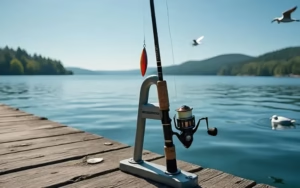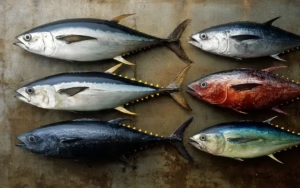Fly fishing is an art that requires precision, patience, and practice. For many anglers, the goal is to enhance their fishing skill with fly fishing, allowing them to catch more fish and enjoy the sport to its fullest.
Fly fishing offers a unique set of challenges and rewards. By mastering the techniques and understanding the nuances of fly fishing, anglers can significantly improve their chances of success on the water. Whether you’re a beginner or an experienced angler, learning the intricacies of fly fishing can be a rewarding experience.
As we explore the world of fly fishing, we’ll provide you with valuable tips and insights to help you enhance your fishing skill with fly fishing. From understanding the basics to advanced techniques, our guide is designed to help you become a proficient fly fisher.
Key Takeaways
- Understand the basics of fly fishing and its benefits
- Learn techniques to improve your casting and presentation
- Discover how to read the water and identify fish habitats
- Explore the different types of flies and their uses
- Gain insights into effective strategies for catching fish with fly fishing
The Fundamentals of Fly Fishing
To enhance your fishing skill with fly fishing, understanding its fundamentals is crucial. Fly fishing is a unique and challenging method of fishing that requires a combination of technique, strategy, and patience.
Fly fishing differs significantly from other fishing methods, primarily in its use of a weighted line to cast a nearly weightless lure or fly. This technique allows anglers to present their fly with precision and delicacy, mimicking the natural movement of insects on or near the water’s surface.
What Sets Fly Fishing Apart from Other Methods
Fly fishing is distinct due to its casting technique, which involves using the weight of the line to propel the fly forward. This method requires a high degree of accuracy and control, making it both challenging and rewarding.
| Fishing Method | Casting Technique | Presentation |
| Fly Fishing | Weighted line | Delicate, precise |
| Spin Fishing | Lure weight | Variable |
| Bait Casting | Lure weight | Accurate, but less delicate |
Why Fly Fishing Rewards Skill Development
Fly fishing rewards skill development because it demands precision, patience, and a deep understanding of the environment and the target species. As anglers improve their casting, reading water, and presentation skills, they become more effective and successful.
By focusing on enhance your fishing skill with fly fishing, anglers can enjoy a more engaging and productive fishing experience. The complexity and nuance of fly fishing make it a lifelong learning journey, with opportunities for continuous improvement and skill refinement.
Essential Gear for Success on the Water
To enhance your fishing skill with fly fishing, having the right gear is crucial. The journey to becoming a proficient fly fisher begins with understanding the essential components of your arsenal.
Choosing the Right Rod, Reel, and Line Combinations
Selecting the appropriate rod, reel, and line combination is fundamental to fly fishing success. The rod’s action, reel’s drag system, and line’s weight and type must be matched to the fishing conditions and target species.
Weight Ratings and Their Importance
The weight rating of your fly rod is critical as it determines the line weight it is designed to handle. Using a rod with the correct weight rating for your line ensures better casting performance and reduces the risk of damaging your gear.
Budget vs. Premium Options
While budget-friendly options are available, premium gear often provides superior performance, durability, and overall fishing experience. Investing in quality gear can enhance your fishing skill with fly fishing by providing a more responsive and reliable tool.
Understanding Fly Types and Their Applications
Flies come in various types, each designed to imitate different stages or types of aquatic life. Understanding when and how to use different flies is crucial for success. For instance, dry flies float on the surface, imitating adult insects, while nymphs and streamers imitate larvae and baitfish, respectively.
| Fly Type | Application | Target Species |
| Dry Flies | Surface fishing, imitating adult insects | Trouts, Panfish |
| Nymphs | Subsurface, imitating larvae | Trouts, Bass |
| Streamers | Subsurface, imitating baitfish | Bass, Pike, Trouts |
Accessories That Make a Difference
Accessories such as fly boxes, leaders, and tippet material are essential for organizing and presenting your flies effectively. Additionally, tools like forceps, net, and a multi-tool can greatly enhance your fishing experience by providing practical solutions on the water.
“The right gear can make all the difference in fly fishing. It’s not just about catching fish; it’s about the experience and the skill development that comes with it.”

By focusing on the right gear and understanding its applications, anglers can significantly enhance their fishing skill with fly fishing, leading to a more rewarding experience on the water.
Mastering Fundamental Casting Techniques
Casting is the backbone of fly fishing, and refining this skill is vital for a successful fishing experience. To enhance your fishing skill with fly fishing, it’s crucial to start with the basics.
The Basic Forward and Backcast Sequence
The foundation of fly casting lies in the forward and backcast sequence. This motion is repetitive and requires timing and practice to master. The backcast is just as important as the forward cast, as it sets up the rod for the next forward motion.
The 10-2 Clock Position Method
One effective way to think about your casting motion is by using the 10-2 clock position method. Imagine the clock face in front of you; the rod tip should move from the 10 o’clock position to the 2 o’clock position. This visualization helps in achieving a smooth, controlled cast.
Developing Proper Timing and Rhythm
Timing and rhythm are critical in casting. Practice is key to developing a consistent rhythm. Start with short casts and gradually increase the distance as you become more comfortable with the motion.
Roll Casting for Tight Spaces
Roll casting is a valuable technique for situations where there’s limited space behind you. It involves using the water or the ground to load the rod, allowing you to cast without a backcast. This technique is particularly useful in dense vegetation or when fishing from a boat.

Common Casting Mistakes and How to Fix Them
Even experienced anglers can fall into bad casting habits. Common mistakes include not keeping the rod tip low during the backcast, applying too much force, and not following through with the cast. To improve fly casting skills, it’s essential to identify and correct these mistakes.
By focusing on these fundamental casting techniques and practicing regularly, you can significantly enhance your fishing skill with fly fishing. Remember, the key to mastery is consistent practice and a willingness to learn and adapt.
How to Enhance Your Fishing Skill with Fly Fishing
To enhance your fishing skill with fly fishing, understanding the water is crucial. Fly fishing is not just about casting a line; it’s about comprehending the environment you’re fishing in.
Reading Water and Identifying Productive Fishing Spots
One of the first steps to enhance your fishing skill with fly fishing is learning to read water. This involves understanding the currents, structures, and habitats that fish prefer.
Understanding Current Seams and Feeding Lanes
Current seams are areas where different water speeds meet, creating a rich feeding ground for fish. Identifying these seams can significantly enhance your fishing skill with fly fishing. Feeding lanes, on the other hand, are paths that fish follow to feed, often along structures or drop-offs.
Recognizing Fish Holding Areas
Fish tend to congregate in areas that provide shelter and food. These holding areas can be behind boulders, undercut banks, or near submerged vegetation. Recognizing these areas is key to enhancing your fishing skill with fly fishing.
Presentation Strategies That Trigger Strikes
The way you present your fly can make or break your chances of catching fish. To enhance your fishing skill with fly fishing, you need to master various presentation strategies.
- Use the right fly for the job, matching the hatch when necessary.
- Vary your retrieve to mimic the natural movement of the fly.
- Pay attention to your line and leader, ensuring they don’t spook the fish.
Adapting Your Approach to Weather and Water Conditions
Weather and water conditions can dramatically affect fish behavior. To enhance your fishing skill with fly fishing, you must be willing to adapt your approach accordingly.
For example, on bright days, fish may seek deeper waters or shaded areas. In contrast, overcast days can bring fish to the surface. Understanding these patterns can help you enhance your fishing skill with fly fishing.
By following these strategies and continually practicing, you can significantly enhance your fishing skill with fly fishing and become a more proficient angler.
Advanced Techniques for the Dedicated Angler
For dedicated anglers, enhancing their fishing skill with fly fishing requires delving into sophisticated methods and strategies. As we explore these advanced techniques, we’ll cover specialized casts, essential knots, and species-specific approaches to take our fishing to the next level.
he surface, anglers can sink their fly quickly, reaching fish that hold in turbulent currents.
Essential Fly Fishing Knots Every Angler Should Know
Understanding and mastering essential fly fishing knots is vital for any angler. These knots ensure that our gear remains secure and our presentations remain effective.
Species-Specific Strategies and Seasonal Approaches
Different species and seasonal changes require adapted strategies. By understanding the behaviors and habitats of our target species, we can tailor our approach to maximize our chances of success.
By incorporating these advanced techniques into our fly fishing repertoire, we can significantly enhance our fishing skill with fly fishing, becoming more effective and confident anglers.
Conclusion: Your Path to Fly Fishing Mastery
As we have explored throughout this article, mastering fly fishing requires a combination of the right gear, technique, and understanding of the water. By following the tips and strategies outlined, beginners can significantly improve their skills and enjoy the many benefits of learning fly fishing.
To truly enhance your fishing skill with fly fishing, consistent practice and a willingness to learn are essential. As you continue on your fly fishing journey, remember that every cast and every catch is an opportunity to refine your technique and deepen your connection with nature.
For those just starting out, focusing on beginners fly fishing tips such as proper casting, reading water, and selecting the right flies will lay a solid foundation. As you progress, you’ll discover the benefits of learning fly fishing, including improved patience, focus, and a greater appreciation for the outdoors.
By dedicating yourself to the art of fly fishing, you’ll not only enhance your fishing skill with fly fishing but also become part of a community that values conservation, skill, and the joy of the catch. We encourage you to keep practicing, stay curious, and enjoy the journey to fly fishing mastery.




